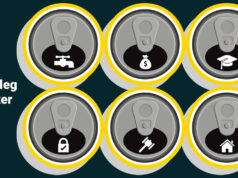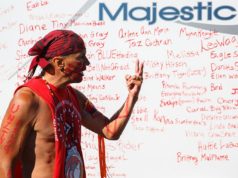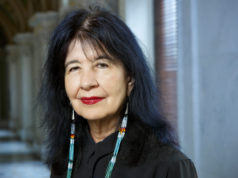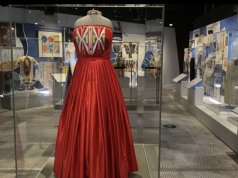For a college course at the University of Oklahoma, I read the book Indians in Unexpected Places by Philip Deloria. The paper I turned in about it received a fair-to-middling grade, but a point from the book has always stuck with me: that Indian stereotypes have us frozen in the past.
Most of the time in popular culture, Native Americans are set pieces for a Western genre, so it feels unexpected when we see a native secretary of the interior, or native people working as attorneys, or as writers, directors and producers in Hollywood. Such jobs do not fit the idea most Americans have of what it means to be Indigenous.
Since watching Sterlin Harjo and Taika Waititi’s lastest project, Reservation Dogs, I have been thinking about Indians in Unexpected Places more than ever. The native people who have been a part of making Reservation Dogs have traveled a hero’s journey to show up in the most unexpected of places — a screen near you.
Harjo is a citizen of the Seminole Nation of Oklahoma with Muscogee heritage who also attended OU, and Waititi is a Maori writer, director and producer from New Zealand. With Reservation Dogs, the pair has created a world in which every character has palpable and emotional depth, even if they don’t have a ton of screen time. The show’s character development is felt from the jump, especially with the main gang of four teens from an unspecified community in Oklahoma: Alora, Bear, Cheese and Willie Jack (Paulina Alexis kills it).
The way the characters interact with a humorous, family-like, familiarity is immediately endearing. Jokes are cracked constantly among the crew, and the viewer falls right in with them on their adventures, laughs and insecurities. The heavy emotional undertones that run in the background of every show move the action forward without being overly angst ridden. The issues these teens are dealing with are heavy, however, the show’s creators are able to balance that with poignant comedy.
Stunning shots across the bow
Now renewed for a second season, Reservation Dogs features a plethora of subtle references, linking the show with the past and reinforcing positive native pop culture continuities. The show has done for native pop culture what RZA does with beats for the Wu-Tang Clan, soaking the music with cultural reference points but utilizing the samples in a new way that propels the genre forward. At one point in the show, Bear is shown wearing a Wu-Tang shirt, an homage to the influence Black culture has had on native culture.
Streamable on FX on Hulu, Reservation Dogs starts with a nod to the seminal classic native film Smoke Signals, with a radio DJ giving updates about the latest news on the Rez. Donning a ridiculous wig in a bar fight scene, Gary Farmer, echoes his roles in both Smoke Signals and Powwow Highway. Oklahoma rappers and activists Lil Mike and Funny Bone — playing Mose and Mekko — are excellent town gossips coming in with scene-stealing humor and mystic Greek chorus vibes reminiscent of Lauerence Fishburne in Rumble Fish. The second I heard a remix of native rocker Link Wray’s song Rumble set to a showdown, I was hooked.
Two scenes have stuck with me since I binged watched Reservation Dogs’ first four episodes. The first (embedded above) is the introduction of Dallas Goldtooth’s character in a mystic vision. Goldtooth is able to kill an entire genre of majestic native warrior tropes in one minute with his wickedly funny performance. It’s a stunning shot across the bow, early in the show, which clearly states to the viewer: Did you come here for noble savage garbage? Screw you. We’re real. We can be mystic AF, and in the same instance be as funny as Richard Pryor.
In that scene, Goldtooth, Harjo and Waititi are able to encapsulate what Pillip Deloria did with his book and what Bury My Heart At Wounded Knee by Dee Brown and the film Little Big Man did to the western genre. Rez Dogs decimates the view of Indian people from a purely historical or Hollywood role and allows them to be what my tribe, the Cherokee Nation, calls Aniyvwiya (ah-nee-yuh-wee-yah): human beings or real people.
The second scene that has stuck with me occurs in the first episode when a white meth head at a junkyard deadpans, “I’m a Native American,” and Bear and Willie Jack just keep moving, not asking him what the hell he even means. The scene is over before it starts, but it highlights the dark, often subtle and insidious outcomes of American Indian policy and assimilation. A white man, completely disconnected from his tribal community, is technically still a native citizen. But he has lost his culture — the language gone long before that — and all that remains is a hollow addict living at a dump.
As a white man who is also a Cherokee citizen, this scene struck me as both hilarious and terribly sad. It made me ponder all the steps to how my family lost major aspects of our Cherokee cultural heritage. My great grandpa, Duck Henry, would send my grandma and her sisters out of the house when he spoke Cherokee. The language stopped with him. That is not some far-off cultural devastation. I knew my grandma and her sister. My uncle still owns my great grandpa’s allotment land. These losses are not theoretical, and this brief moment in the show reminded me of it.
Living in the confusion of modernity
Harjo, Waititi, the cast and the crew have all joined a small group of people in the unexpected terrain of Hollywood’s film-making community who have been able to portray authentic native stories to the public. Hopefully in the next season there is room to heed the call of black indigenous voices to incorporate their lived experiences within Indian Country storytelling. It would add another layer of authenticity, reinforcing the strong influence of black culture that the show’s creators have previously acknowledged. Being Black and Indigenous or a tribal Freedman descendant is enough to confuse many Americans not familiar with the Native American community, and Reservation Dogs could ultimately help enlighten people on that topic as well.
Through the ups and downs of life Native people are still here, just like everyone else, living in the confusion of modernity with the rest of the world. We’re Aniyvwiya on the Rez, out in Hollywood, and now on a streaming service near you. Give Reservation Dogs a watch and you will understand. Wado.






















